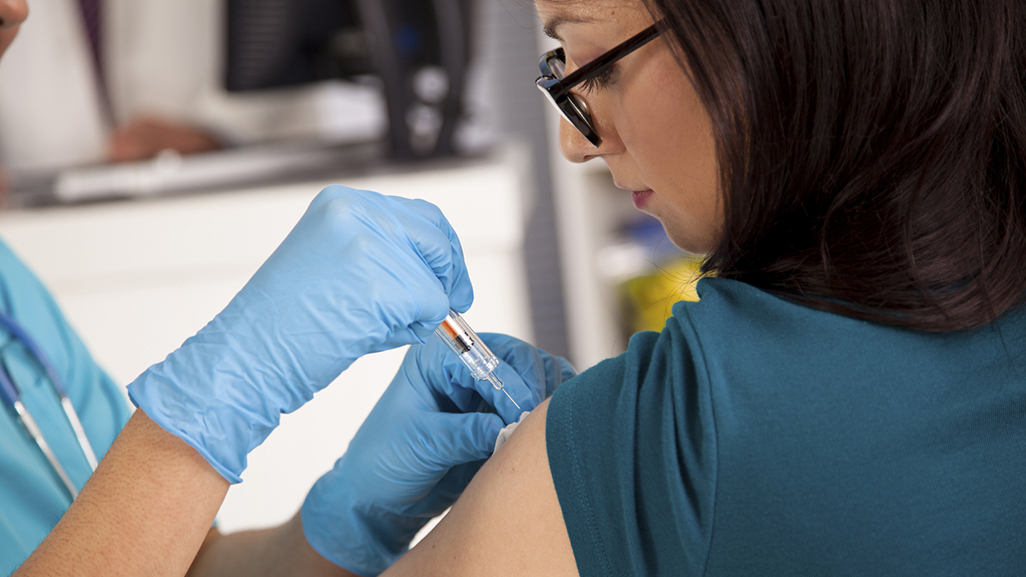The COVID vaccine and pregnancy
If you're pregnant, trying to conceive, or breastfeeding, it's especially important to stay up to date with your COVID vaccine. Here's why.
Was this article helpful?
Yes
No
BabyCenter's editorial team is committed to providing the most helpful and trustworthy pregnancy and parenting information in the world. When creating and updating content, we rely on credible sources: respected health organizations, professional groups of doctors and other experts, and published studies in peer-reviewed journals. We believe you should always know the source of the information you're seeing. Learn more about our editorial and medical review policies.
ACOG. 2023. COVID-19 vaccination considerations for obstetric-gynecologic care. American College of Obstetricians and Gynecologists. https://www.acog.org/clinical/clinical-guidance/practice-advisory/articles/2020/12/covid-19-vaccination-considerations-for-obstetric-gynecologic-careOpens a new window [Accessed September 2023]
ACOG. 2022. COVID-19 vaccines and pregnancy: Conversation guide. American College of Obstetricians and Gynecologists. https://www.acog.org/covid-19/covid-19-vaccines-and-pregnancy-conversation-guide-for-cliniciansOpens a new window [Accessed September 2023]
AHA. 2022. Guidance on Treatment for Rare Blood Clots and Low Platelets Related to COVID-19 vaccine. American Heart Association. https://newsroom.heart.org/news/guidance-on-treatment-for-rare-blood-clots-and-low-platelets-related-to-covid-19-vaccineOpens a new window [Accessed September 2022]
CDC. 2023. CDC recommends updated COVID-19 vaccine for fall/winter virus season. Centers for Disease Control and Prevention. https://www.cdc.gov/media/releases/2023/p0912-COVID-19-Vaccine.htmlOpens a new window [Accessed September 2023]
CDC. 2023. COVID-19. People with certain medical conditions. Centers for Disease Control and Prevention. https://www.cdc.gov/coronavirus/2019-ncov/need-extra-precautions/people-with-medical-conditions.htmlOpens a new window [Accessed September 2023]
CDC. 2023. COVID-19 vaccines while pregnant or breastfeeding. Centers for Disease Control and Prevention. https://www.cdc.gov/coronavirus/2019-ncov/vaccines/recommendations/pregnancy.htmlOpens a new window [Accessed September 2023]
CDC. 2023. Getting your COVID-19 vaccine. Centers for Disease Control and Prevention. https://www.cdc.gov/coronavirus/2019-ncov/vaccines/expect.htmlOpens a new window [Accessed September 2023]
CDC. 2023. Janssen (Johnson & Johnson) COVID-19 vaccine. Centers for Disease Control and Prevention. https://www.cdc.gov/vaccines/covid-19/info-by-product/janssen/index.htmlOpens a new window [Accessed September 2023]
CDC. 2023. Stay Up to Date with COVID-19 Vaccines. Centers for Disease Control and Prevention. https://www.cdc.gov/coronavirus/2019-ncov/vaccines/stay-up-to-date.htmlOpens a new window [Accessed September 2022]
CDC. 2023. COVID-19. Investigating long-term effects of myocarditis. Centers for Disease Control and Prevention. https://www.cdc.gov/coronavirus/2019-ncov/vaccines/safety/myo-outcomes.htmlOpens a new window [Accessed September 2023]
CDC. 2023. Overview of COVID-19 vaccines. Centers for Disease Control and Prevention. https://www.cdc.gov/coronavirus/2019-ncov/vaccines/different-vaccines/overview-COVID-19-vaccines.htmlOpens a new window [Accessed September 2023]
Ciapponi A et al. 2023. Safety of COVID-19 vaccines during pregnancy: A systematic review and meta-analysis. Vaccine 41(25): 3688-3700. https://www.sciencedirect.com/science/article/pii/S0264410X23003328Opens a new window [Accessed September 2023]
FDA. 2022. Coronavirus (COVID-19) Update: FDA Authorizes Moderna, Pfizer-BioNTech Bivalent COVID-19 Vaccines for Use as a Booster Dose. U.S. Food & Drug Association. https://www.fda.gov/news-events/press-announcements/coronavirus-covid-19-update-fda-authorizes-moderna-pfizer-biontech-bivalent-covid-19-vaccines-useOpens a new window [Accessed September 2023]
Lin DY et al. 2023. Effectiveness of bivalent boosters against severe omicron infection. New England Journal of Medicine. https://www.ncbi.nlm.nih.gov/pmc/articles/PMC9933929/Opens a new window [Accessed September 2023]
Morgan JA et al 2022. Maternal outcomes after severe acute respiratory syndrome Coronavirus 2 (SARS-CoV-2) infection in vaccinated compared with unvaccinated pregnant patients. Obstetrics & Gynecology 139(1): 107-109. https://journals.lww.com/greenjournal/citation/2022/01000/maternal_outcomes_after_severe_acute_respiratory.14.aspxOpens a new window [Accessed September 2023]
SMFM.2023. COVID-19 Vaccination in Pregnancy. Society for Maternal-Fetal Medicine. https://s3.amazonaws.com/cdn.smfm.org/media/4181/SMFM_COVID_Vaccine_2023.pdfOpens a new window [Accessed September 2023]
Wesselink AK et al. 2022. A prospective cohort study of COVID-19 vaccination, SARS-CoV-2 infection, and fertility. American Journal of Epidemiology 191(78): 1383-1395. https://pubmed.ncbi.nlm.nih.gov/35051292/Opens a new window [Accessed September 2023]
Zace D et al. 2022. The impact of COVID-19 vaccines on fertility – A systematic review and meta-analysis. Vaccine 40(2): 6023-6034. https://pubmed.ncbi.nlm.nih.gov/36137903/Opens a new window [Accessed September 2023]












































